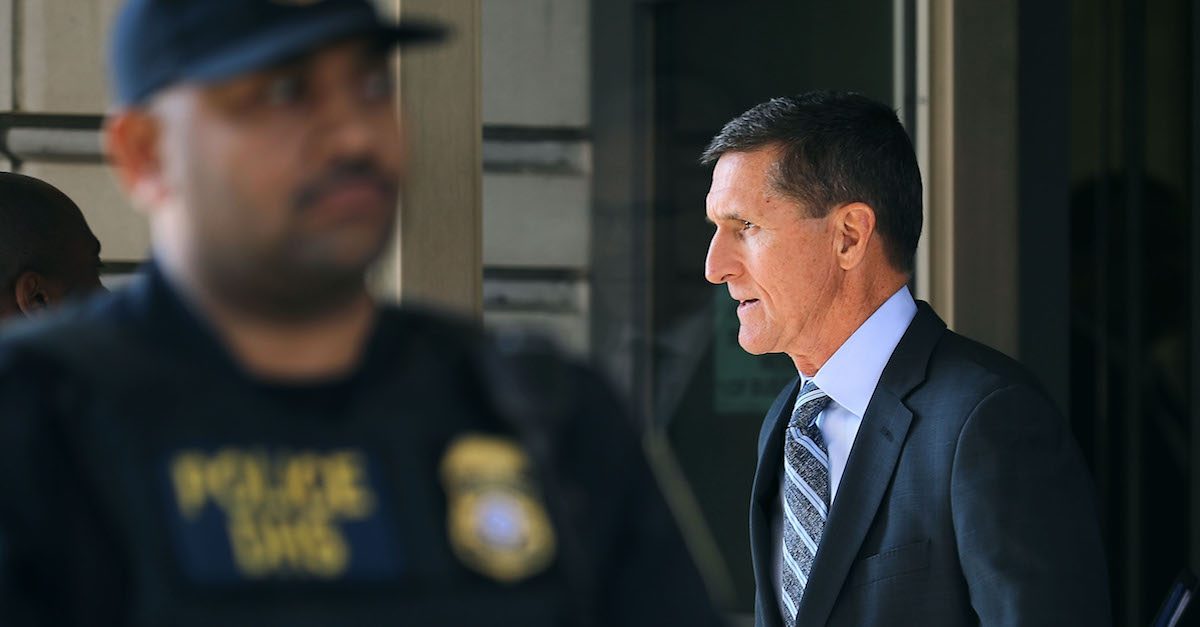
The Department of Justice on Wednesday filed its response to court-appointed amicus curiae John Gleeson in the ongoing dispute over whether U.S. District Judge Emmet Sullivan must grant the DOJ’s motion to dismiss a criminal charge against former National Security Advisor Michael Flynn. While less vituperative than the arguments submitted by Flynn’s defense attorney Sidney Powell, the DOJ’s brief is somewhat stunning in that it appears to undercut Powell’s most prominently featured claims – particularly her allegations of prosecutorial misconduct.
The DOJ presented a three-pronged argument as to why the executive branch does not believe Flynn’s case should continue:
“[F]irst, in the Executive’s assessment, the interests of justice do not support continuing the prosecution; second, based on the Executive’s legal analysis and assessment of the strength of the case, proving materiality to a jury beyond a reasonable doubt would be difficult; and third, based on the Executive’s legal analysis and assessment of the strength of the case, proving willful falsity to a jury beyond a reasonable doubt would be difficult,” Assistant U.S. Attorney Jocelyn Ballantine wrote in the brief which was also signed by Acting U.S. Attorney Michael Sherwin and Acting Principal Assistant U.S. Attorney Kenneth Kohl.
The crux of the government’s position is that the executive branch, not the judiciary, is vested with the authority to prosecute and that Judge Sullivan has no authority to continue a prosecution without the support of the Justice Department.
“Under Article II, a court has no power to review that exercise of prosecutorial discretion. And under Article III, there is no longer any case or controversy between the government and the defendant over which this Court may properly exert judicial power,” the brief stated. Powell argued as well that there is no longer a case or controversy.
The DOJ also contended that the “leave of the court” requirement enshrined in Rule 48(a) of the Federal Rules of Civil Procedure for dismissing a criminal case is applicable to protect a defendant from prosecutorial harassment, which is not applicable where the defendant supports the motion.
While the DOJ is still pushing for the charge against Flynn to be dismissed, the brief conceded that Flynn did lie to investigators, arguing only that it would be difficult to prove to a jury that the lies were material to the investigation. Materiality is an element of the false statements crime.
“The government obtained Flynn’s plea on the theory that his ‘false statements and omissions impeded and otherwise had a material impact on the FBI’s ongoing investigation into the existence of any links or coordination between individuals associated with the [Trump] Campaign and Russia’s efforts to interfere with the 2016 presidential election.’ (A fact, it bears noting, that was not in Flynn’s personal knowledge.),” the DOJ wrote. “But the government identified substantial evidence that neither the truthful information nor the fact of any false statement was influential in that investigation.”
Prosecutors then tried to explain why they were basing their analysis of Flynn’s case on how it would be perceived by a potential jury when he had already entered two guilty pleas in the case.
“Given Flynn’s efforts to withdraw the plea, the government’s assessment of how a jury would perceive his explanations for pleading guilty, and the government’s assessment of the evidence independent of the plea, the government determined that it should not rely on the plea in this case,” the brief explained.
The DOJ also rejected Flynn’s defense attorney’s contention that federal prosecutors withheld evidence or engaged in any kind of misconduct.
“The government disclosed approximately 25 pages of documents in April and May 2020 as the result of an independent review of this case by the United States Attorney for the Eastern District of Missouri,” the brief stated in a footnote. “While those documents, along with other recently available information . . . are relevant to the government’s discretionary decision to dismiss this case, the government’s motion is not based on defendant Flynn’s broad allegations of prosecutorial misconduct. Flynn’s allegations are unfounded and provide no basis for impugning the prosecutors from the D.C. United States Attorney’s Office.”
Read the full brief below.
DOJ Gleeson Response by Law&Crime on Scribd
[image via Chip Somodevilla/Getty Images]